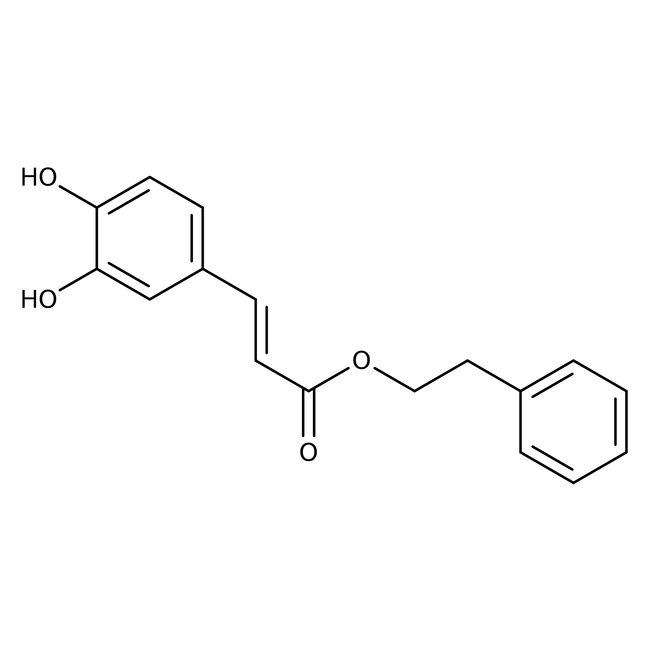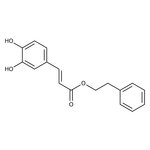Search Thermo Fisher Scientific
Thermo Scientific Chemicals
Phenylethyl 3,4-dihydroxycinnamate, 98+%, Thermo Scientific Chemicals
Inhibitor of protein tyrosine kinase, and is cytotoxic to cancer cell lines
Catalog number ALFJ61386.MD
Quantity:
250 mg
Chemical Identifiers
CAS7446-07-3
IUPAC Name(oxo-λ⁴-tellanylidene)oxidane
Molecular FormulaO2Te
InChI KeyLAJZODKXOMJMPK-UHFFFAOYSA-N
SMILESO=[Te]=O
View more
Specifications Specification Sheet
Specification Sheet
FormPowder
Appearance (Color)White to pale yellow
Total Metal Impurities≤0.001%
Phenylethyl 3,4-dihydroxycinnamate is a potent and specific inhibitor of nuclear transcription factor, NF-κB, activation. It has been shown to significantly suppress the lipoxygenase pathway of arachidonic acid metabolism during inflammation. It inhibits HIV-1 integrase and also inhibits proliferation of transformed cells. It induces apoptosis in transformed fibroblasts, and interferes with EGF signal transduction affecting both protein kinase C and ornithine decarboxylase activity.
This Thermo Scientific Chemicals brand product was originally part of the Alfa Aesar product portfolio. Some documentation and label information may refer to the legacy brand. The original Alfa Aesar product / item code or SKU reference has not changed as a part of the brand transition to Thermo Scientific Chemicals.
Applications
Phenylethyl 3,4-dihydroxycinnamate is a potent and specific inhibitor of nuclear transcription factor, NF-κB, activation. It has been shown to significantly suppress the lipoxygenase pathway of arachidonic acid metabolism during inflammation. It inhibits HIV-1 integrase and also inhibits proliferation of transformed cells. It induces apoptosis in transformed fibroblasts, and interferes with EGF signal transduction affecting both protein kinase C and ornithine decarboxylase activity.
Solubility
Soluble in ethyl acetate at 50mg/ml. Soluble in DMSO and ethanol.
Notes
Light sensitive. Incompatible with oxidizing agents and heat.
Phenylethyl 3,4-dihydroxycinnamate is a potent and specific inhibitor of nuclear transcription factor, NF-κB, activation. It has been shown to significantly suppress the lipoxygenase pathway of arachidonic acid metabolism during inflammation. It inhibits HIV-1 integrase and also inhibits proliferation of transformed cells. It induces apoptosis in transformed fibroblasts, and interferes with EGF signal transduction affecting both protein kinase C and ornithine decarboxylase activity.
Solubility
Soluble in ethyl acetate at 50mg/ml. Soluble in DMSO and ethanol.
Notes
Light sensitive. Incompatible with oxidizing agents and heat.
RUO – Research Use Only
General References:
- M.R.Fesen; Y.Pommier; F.Leteurtre; S.Hiroguchi; J.Yung; K.W.Kohn; Mark R.Fesen; Yves Pommier; Francois Leteurtre; Satoshi Hiroguchi; Jessie Yung; Kurt W.Kohn. Inhibition of HIV-1 integrase by flavones, caffeic acid phenethyl ester (CAPE) and related compounds. Biochemical Pharmacology. 1994, 48,(3), 595-608.
- Z.S.Zheng; G.Z.Xue; D.Grunberger; J.H.Prystowsky. Caffeic acid phenethyl ester inhibits proliferation of human keratinocytes and interferes with the EGF regulation of ornithine decarboxylase. Oncology Research. 1995, 7,(9), 445-452.




